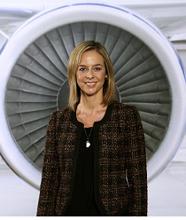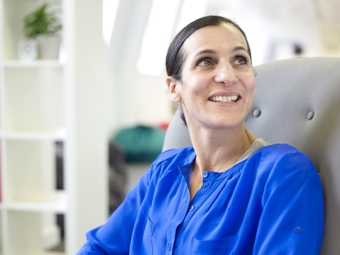Emma Langford, head of legal at Thomas Cook Group Airlines...
Emma, firstly – can you tell readers of The Brief a bit about yourself and background?
Sure, I am the head of legal for Thomas Cook Group Airlines. I joined Thomas Cook almost ten years ago having joined as a junior commercial lawyer. I started my career in private practice in Chester after studying law at the University of Manchester and completing my LPC at the College of Law in Chester. I grew up in Wales and now live in Cheshire.
You’re now Group Airlines Head of Legal at Thomas Cook Group, so what does your day to day role entail?
I am based at Manchester Airport but the Group consists of airlines based in the UK, Germany, Scandinavia and Belgium and so my role involves regular travel. Thomas Cook is a fast moving business and, whilst I know it may sound a cliché, no two days in the legal team are the same. Urgent matters crop up most days - and so it is very difficult to plan my day! I work closely with the airline management team and also with the Group legal team in London. My legal work consists of general commercial work, governance matters, compliance, regulatory and industry specific advice - anything and everything that comes up! My role is much wider than purely legal as I sit on management boards and participate in the decision making process of general business and strategic matters.
As a business, Thomas Cook is half way through a much publicised transformation programme. Can you tell us a bit more about that?
Yes, the turnaround programme commenced 18 months ago with the appointment of our new Group CEO, Harriet Green. Such a lot has changed in that time. We are half-way through the transformation now and huge progress has been made, although everyone in the business recognises there is still a lot to do and we are very focused on that. The financial situation has improved dramatically and the share price has responded positively. We have launched a new, unified brand across the Group under the new ‘sunny heart’ logo. There has also been a re-focusing on the core business of the Group and a divesture of non-core businesses.
How has your role evolved and what has the transformation meant for you and your team?
My role has evolved enormously over the ten years since I joined. At that time I was a junior lawyer working as part of a large legal team. I moved gradually into the airline part of the business. I was promoted to head of legal for the UK airlines – and recently into my role as head of legal for the group airlines. The responsibility and workload have obviously increased as I have progressed through the business.
The transformation programme has been very intense. So much was achieved in the first year. For example, the coming together of all four airlines was a significant change. Previously, each airline had acted individually but we are now aligned and moving in the same direction with one clear strategy. This has of course meant a very busy period for the legal team. That has necessitated growth in the team as the demands change and the business has been supportive of that. What is really key is that the legal team is fully aware of the strategic targets of the business and appreciate the important role it has to play in moving forward.
What do you think will be the biggest challenges and opportunities in the airline industry moving forward?
It is a fast moving industry. Low cost airlines of course present a challenge as they grow and expand into routes which we operate. In order to compete with these airlines and offer competitive pricing to our customers we have to consistently be cost conscious within the business. In terms of opportunities, we listen to our customers and are always looking out for new routes that they want. For example, this winter saw the introduction of new Caribbean routes that are proving a real success.
A key topic of concern in the airline industry as a whole at the moment is the issue of flight delay compensation, which is a huge cost to us and other airlines, and so we are relentlessly looking at ways to reduce delays, improve our on-time performance and deliver exceptional customer service.
What’s next for Thomas Cook as a business?
We are now well into the second year of the turnaround plan with lots still to do. Going forward we will be continuing to focus on the web, improving our web presence and increasing web sales - and also an emphasis on improving the UK tour operator business. It is an exciting time in the airlines part of the business as we are bringing brand new aircraft into our fleet and looking at new and exciting routes.
What made you move in-house from private practice?
My first experience of working in-house was when I went on secondment for six months to a client when I was 18 months’ qualified – I was completely thrown in at the deep end and I enjoyed it enormously. It was at that point that I decided that a career in-house was the way forward for me. I would always recommend a secondment, if possible, to anyone considering a career in-house as it is very different from private practice and a secondment is a great way to see whether it is for you.
What do you think are the main benefits for a company that employs an in-house legal team?
The main benefit, I think, is being close to the business and so we are more likely to understand the business, the strategy and what it needs from us as legal advisors. We also better understand the background to deals/projects, the reasons for them and what the business is trying to achieve.
There is also the obvious advantage of being there on-site and able to respond quickly when the need arises. Being visible and available to the business means they are more likely to come and speak to you about something that they may not otherwise have done. I think it is important as an in-house lawyer to encourage an open-door policy so that they know they can always approach you and seek your advice and guidance.
Finally, what advice would you give to someone looking to develop their career in-house and be successful as an in-house lawyer?
First of all I would say that it is a very rewarding career but that you have to give it your all in order to be successful. It’s really important, I think, to try and be more than’ just a lawyer’ and to really engage with the business, understand how it operates and its strategy – only then can you really add value as an in-house advisor and ensure that your advice is aligned with the aims of the business. I’m currently studying a one-year executive business management course at Cranfield University which I hope will enable me to better understand business topics and issues and therefore enable me to provide even more commercially focused legal advice.
I also think it is important to be flexible and adaptable when working in-house because things are changing constantly and you have to be prepared to embrace change and look for ways in which it can be advantageous for you.
It is important to be proactive in your role and not just wait for the business to come to you with problems or seek advice, you really need to be continually looking for ways in which you can improve things, create new initiatives and drive matters forward – I believe that is how you can become a valued advisor to the business and key to its success.
Finally, the team you work with is fundamental. I enjoy tremendous support from the senior management of the business and it really does make a difference.
---
LinkedIn: http://uk.linkedin.com/pub/emma-langford/9/836/aab/
Company links:
http://www.thomascookgroup.com
http://www.thomascookairlines.com
http://www.thomascook.com









